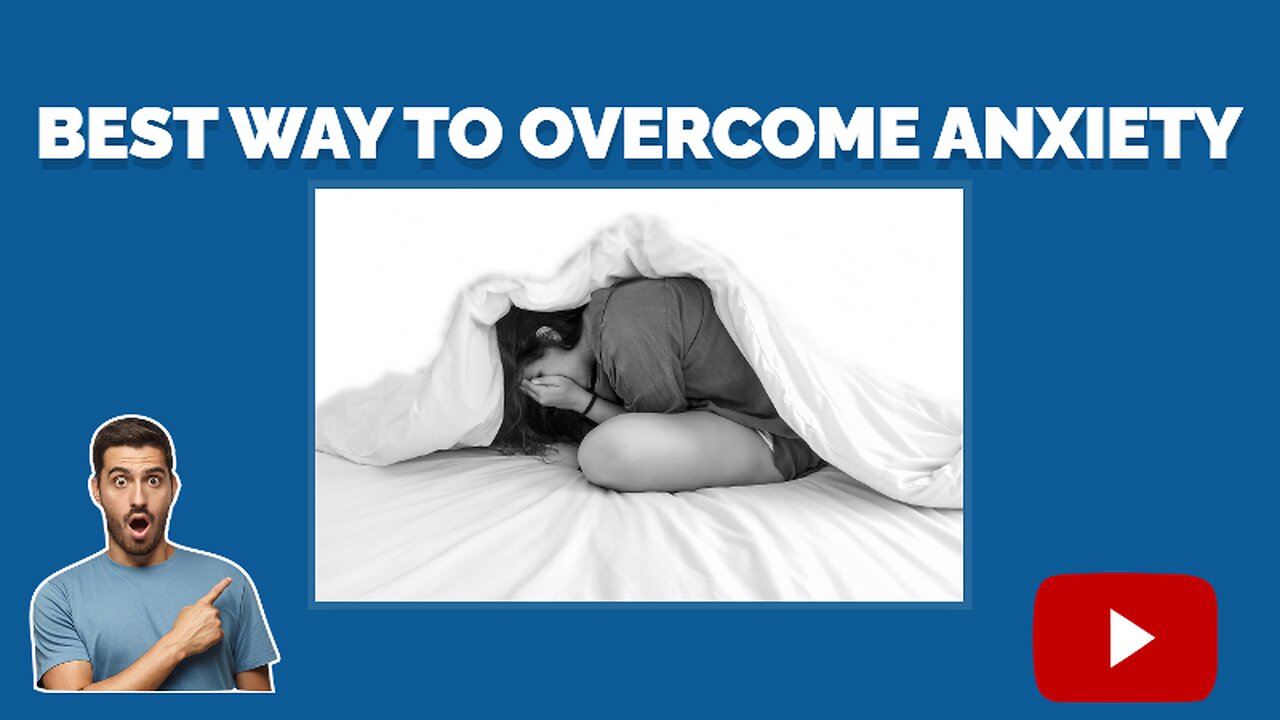Premium Only Content

Best Way to Overcome Anxiety
Overcoming anxiety is a personal journey, and what works best can vary from person to person. It's essential to remember that anxiety is a common and treatable condition, and seeking help and support is a sign of strength. Here are some strategies that can help you manage and overcome anxiety:
Seek Professional Help: A mental health professional, such as a therapist or psychiatrist, can provide you with personalized treatment options and strategies. Cognitive-behavioral therapy (CBT), exposure therapy, and medication (if necessary) are effective treatments for anxiety disorders.
Practice Mindfulness and Relaxation Techniques:
Mindfulness Meditation: Learning to be present in the moment can help reduce anxiety. Mindfulness meditation can teach you to observe your thoughts without judgment.
Deep Breathing: Practice deep and controlled breathing techniques to calm your nervous system. The 4-7-8 technique is one example: inhale for 4 seconds, hold for 7 seconds, and exhale for 8 seconds.
Progressive Muscle Relaxation: This involves tensing and then releasing different muscle groups in your body, which can help reduce physical tension.
Exercise Regularly: Physical activity is a powerful way to reduce anxiety. It releases endorphins, which are natural mood lifters. Aim for at least 30 minutes of moderate exercise most days of the week.
Maintain a Healthy Diet: Your diet can impact your mood and anxiety levels. Limit caffeine and sugar intake, and focus on a balanced diet rich in whole foods, including fruits, vegetables, lean proteins, and whole grains.
Get Adequate Sleep: Poor sleep can exacerbate anxiety symptoms. Create a consistent sleep schedule and practice good sleep hygiene to ensure you get enough rest.
Limit Stimulants: Reduce or eliminate the use of alcohol, nicotine, and recreational drugs, as they can worsen anxiety.
Challenge Negative Thoughts: Pay attention to your thought patterns and challenge irrational or negative thoughts. Cognitive-behavioral therapy can be especially helpful in this regard.
Set Realistic Goals: Break down overwhelming tasks into smaller, manageable steps. Setting achievable goals can reduce feelings of anxiety.
Build a Support System: Share your feelings with trusted friends and family members. Sometimes, just talking about your worries can be relieving. Consider joining support groups or seeking out online communities where you can connect with others who have similar experiences.
Self-Care: Prioritize self-care activities that bring you joy and relaxation, such as hobbies, reading, or spending time in nature.
Limit Information Overload: In the digital age, constant exposure to news and social media can contribute to anxiety. Set boundaries for media consumption and take breaks from screens.
Medication: In some cases, medication prescribed by a healthcare professional may be necessary to manage severe anxiety symptoms. Medication should be used in conjunction with therapy and other self-help strategies.
Remember that overcoming anxiety is often a gradual process, and setbacks can occur. Be patient with yourself and continue to seek professional guidance and support. It's important to work closely with a healthcare provider to develop a personalized plan for managing your anxiety.
-
 8:28
8:28
MattMorseTV
16 hours ago $9.27 earnedThe EU just SURRENDERED to Trump.
50.4K48 -
 2:09:17
2:09:17
Side Scrollers Podcast
21 hours agoKirsche & Leaflit on HIT LIST + Nintendo RUINS Mario Kart + More | Side Scrollers Live
24.9K7 -
 14:17
14:17
GritsGG
1 day agoCopy Our Strategy We Use to Win & Instantly Improve!
29K3 -
 6:08:23
6:08:23
The Pascal Show
21 hours ago $8.00 earnedDIDDY TRIAL LIVE! HERE WE GO! Feds Begin Closing Arguments Trial Day 31 & MORE
32.7K3 -
 3:24:49
3:24:49
GamerGril
10 hours agoTGI-FrightDay | A Gril Among Us
34.9K11 -
 1:19:26
1:19:26
Man in America
16 hours agoIs MAHA Pushing the WEF’s Wearable Agenda? w/ Dr. Ealy
132K109 -
 8:35:28
8:35:28
SpartakusLIVE
15 hours agoNEW Loadouts have DROPPED from ADVANCEDgg || !advanced
87.1K4 -
 30:28
30:28
Solar Groove Muzic
1 day ago $10.52 earnedAFRO HOUSE MIX 2025 | The Best of Afro House Music
58.9K5 -
 41:00
41:00
The Finance Hub
22 hours ago $8.52 earnedI CAN'T BELIEVE WHAT JUST HAPPENED TO SEN. ADAM SCHIFF!
32K30 -
 3:52:16
3:52:16
SynthTrax & DJ Cheezus Livestreams
1 day agoFriday Night Synthwave 80s 90s Electronica and more DJ MIX Livestream HEATWAVE Edition
58.9K18